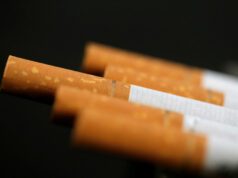Excise tax take surges, beats target on increased rates
EXCISE TAX collections surged by nearly three-fourths in the first two months of the year, driven by bigger taxes on cars, tobacco, alcohol and other products especially after a new law raised rates on various items as the year began, the Department of Finance (DoF) said in a statement on Wednesday.
“Total excise tax collections imposed on various products for the January-February period amounted to P44.49 billion as against the target for this period of P38.53 billion, or an excess of P5.95 billion,” the department said.
“Compared with actual collections of P25.53 billion in 2017 for the same period, this represented an increase of 74.23%.”
Republic Act No. 10963 — or the Tax Reform for Acceleration and Inclusion (TRAIN) law — reduced personal income, estate and donors tax rates, but removed some value-added tax exemptions; hiked excise tax rates for automobiles, minerals, tobacco and fuel; as well as imposed new excise levies on sugar-sweetened beverages and cosmetic procedures.
Excise tax collections accounted for 15.85% of the overall Bureau of Internal Revenue (BIR) take in the first two months of the year that totaled some P280.69 billion, 10.8% more than the P253.25 billion recorded in the same period in 2017 and 16% more than a P242.137-billion target.
“At the moment, we are collecting more ’sin’ taxes than projected. This is a good sign,” Finance Secretary Carlos G. Dominguez III was quoted in the statement as saying.
Broken down, tobacco excise taxes reached P24.04 billion in January to February, a 74.3% increase from P13.79 billion last year, breaching a P14.93-billion target by 61%, according to the DoF.
Mr. Dominguez noted that the sale of Mighty Corp.’s assets to Japan Tobacco International — after the government caught the former evading taxes — enabled the BIR to collect P2-billion taxes more per month. He said that the international tobacco maker is expected to pay some P40 billion in excise taxes this year, or about a third of the P118 billion in projected annual revenue from tobacco products this year.
“Cigarette manufacturing has always been a troublesome sector as far as collecting proper taxes is concerned. With new tools for surveillance, documentation of tax payments, and cooperation between tax and customs authorities, this should be a smaller problem in the future,” he added.
Collections from alcohol excise taxes meanwhile reached P9.82 billion, surpassing its P8.31-billion goal by 18.17%.
From automobiles, the BIR raked in P810.31 million, 25.85% over the P643.86-million target, while taxes on minerals totaled P464.23 million, 50.9% more than the P307.64-million target.
Moreover, taxes on petroleum product sales generated P4.79 billion, sugar-sweetened beverage sales yielded P4.53 billion and non-essential goods, P15.65 million.
The Development Budget Coordinating Committee in its Dec. 22 meeting projected that the TRAIN law would contribute some P82.3-billion additional revenues this year.
“I look forward to more accomplishments similar to the case of Mighty Corp. These accomplishments highlight the vigilance and professionalism of our revenue agencies.”
The BIR is tasked to collect P2.039 trillion in taxes in 2018, 11.48% more than the P1.829-trillion goal it initially set early last year. If realized, this would also be 14.6% more than the P1.779 trillion collected in 2017. — Elijah Joseph C. Tubayan



